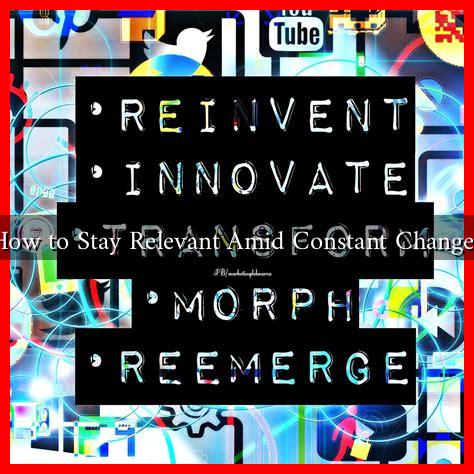-
Table of Contents
How to Stay Relevant Amid Constant Change?
In today’s fast-paced world, change is the only constant. Whether it’s technological advancements, shifts in consumer behavior, or evolving workplace dynamics, staying relevant can feel like an uphill battle. However, with the right strategies, individuals and organizations can not only adapt but thrive in the face of change. This article explores effective ways to maintain relevance in an ever-changing landscape.
Understanding the Nature of Change
Before diving into strategies for staying relevant, it’s essential to understand the nature of change. Change can be categorized into several types:
- Technological Change: Innovations that alter how we work and communicate.
- Market Change: Shifts in consumer preferences and behaviors.
- Regulatory Change: New laws and regulations that impact industries.
- Cultural Change: Evolving societal norms and values.
Recognizing these types of change can help individuals and organizations anticipate and prepare for the future.
Embrace Lifelong Learning
One of the most effective ways to stay relevant is through continuous education and skill development. Lifelong learning enables individuals to adapt to new challenges and opportunities. Here are some ways to embrace this mindset:
- Online Courses: Platforms like Coursera and Udemy offer a plethora of courses on various subjects.
- Workshops and Seminars: Attend industry-related events to gain insights and network with peers.
- Reading: Stay updated with the latest books, articles, and research in your field.
According to a report by the World Economic Forum, 94% of business leaders expect employees to pick up new skills on the job. This statistic underscores the importance of being proactive in learning.
Leverage Technology
In an era where technology is rapidly evolving, leveraging the right tools can significantly enhance your relevance. Here are some technologies to consider:
- Artificial Intelligence: Use AI tools for data analysis, customer service, and personalized marketing.
- Collaboration Tools: Platforms like Slack and Microsoft Teams facilitate better communication and project management.
- Social Media: Utilize social media for networking, brand building, and staying informed about industry trends.
For instance, companies like Netflix have successfully adapted to technological changes by leveraging data analytics to understand viewer preferences, allowing them to stay ahead of competitors.
Build a Strong Network
Networking is crucial for staying relevant. A robust professional network can provide support, insights, and opportunities. Here are some tips for effective networking:
- Attend Industry Events: Conferences and trade shows are excellent places to meet like-minded professionals.
- Join Professional Associations: Becoming a member of relevant organizations can open doors to new opportunities.
- Utilize LinkedIn: Regularly update your profile and engage with your connections to maintain visibility.
According to a survey by LinkedIn, 85% of jobs are filled through networking, highlighting its importance in career advancement.
Stay Agile and Adaptable
Agility is key to navigating change effectively. Organizations and individuals that can pivot quickly in response to new information or circumstances are more likely to succeed. Here are some strategies to enhance agility:
- Embrace Feedback: Regularly seek feedback from peers and mentors to identify areas for improvement.
- Experiment: Don’t be afraid to try new approaches and learn from failures.
- Stay Informed: Keep abreast of industry trends and emerging technologies to anticipate changes.
For example, companies like Amazon have thrived by continuously innovating and adapting their business models to meet changing consumer demands.
Conclusion
Staying relevant amid constant change requires a proactive approach that encompasses lifelong learning, leveraging technology, building a strong network, and maintaining agility. By embracing these strategies, individuals and organizations can not only survive but thrive in an ever-evolving landscape. Remember, the key to relevance is not just adapting to change but anticipating it and positioning yourself as a leader in your field.
For more insights on staying relevant in your career, consider exploring resources from the Forbes Human Resources Council.

